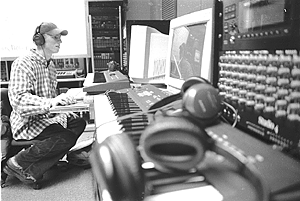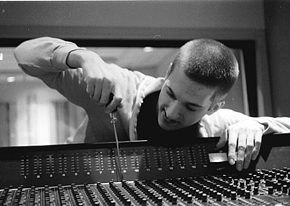

The Conservatory recently signed an agreement with the research arm of AT&T to help the telecommunications giant study distribution of music over the internet.
"AT&T chose Oberlin because they had not found another music institution where there was also a degree of technical sophistication, and vice versa," Richard Povall, chair of the technology in music and related arts department, said. "We have plenty of people who are able to listen critically to audio quality, and many of those same people can understand the technical underpinnings of the encoding algorithm. This is very useful to them."

The collaboration will experiment with AT&T's MPEG-2AAC audio algorithm standard (AAC), a technology which lets musicians record their music at a high quality and upload it to the internet where it can be downloaded by listeners. They are also testing AT&T's DigitalPhono software, which plays the AAC files, and setting up an Oberlin server which allows access to the files.
A burning issue in the music and technology industries right now is the availability of music on-line. MP3, a digital music format, is extremely popular, but it allows for the free downloading of copyrighted music. Therefore recording companies are not receiving compensation and artists are not receiving royalties for their works.
MP3 provides new artists with the opportunity to easily and inexpensively distribute their music without entering into agreements with recording companies, whereas AT&T's AAC technology could make it much more challenging for artists to distribute their own material.

In the press release Jim Snyder, a technical consultant at AT&T said, "The audio quality of MP3 is less than what we use, but many people find it good enough. Our current technology - MPEG-2AAC - provides strong copyright protection, and we are working on techniques that may make it more user-friendly."
The way that the AT&T server will work, according to junior Paul Davis, is that AT&T will sell access to a server where music can be downloaded only from that site to specific computers that paid for access to the server. The file could then only be played from that computer, because the security "wrapping" in the AAC software would make the file unplayable when copied to another computer.
The problem with that, according to Davis, is that "whoever controls the server can be able to control distribution of music on it if this takes off. I'm not excited about that." The price of space on the server would be so high that it is possible only companies could be able to purchase it, and availability to consumers would be limited to what was on the AAC server.
Davis says that although he isn't excited about the possibility of musicians not being able to distribute their music, he is excited that this technology exists. "I can't blame AT&T because they wouldn't make enough money if they didn't sell server space. I don't think AAC will win out, but AT&T is positioning itself to control digital music distribution."
"It's true to say that the recording industry is running scared," Povall said.
"It will do everything it can to eliminate MP3 and other methods of digital distribution. On the one hand, I'm overjoyed that there is a viable way for musicians and artists to distribute their work widely without having to enter into a contractual arrangement with a record company," he said. "On the other hand, if most of this music is being distributed free of charge, then how do these musicians get paid?"
Even with the debate still raging about music distribution, a number of benefits have resulted from the collaboration with AT&T. Povall said, "I think it's more important that Oberlin students are gaining access to some cutting edge technologies, including high quality audio streaming, and surround sound audio streaming. More importantly, we engage in a debate about emerging technologies, and have some influence on how those technologies develop."
Povall said that due to the strong feedback of Oberlin students, AT&T has already made it possible to encode and distribute work without copy protection, which eases some tensions about the AAC server taking away a musician's right to distribute his or her own music.
Davis says AT&T also benefits from this venture because it's a cheap method to receive feedback. "They get open, honest input. I think they're surprised a little bit by the criticism they are getting," he said.
For Davis, the biggest advantage of the collaboration is the possibility of future employment. "From a student's perspective, he said, "the biggest benefit would be that the research gives the people involved 'ins' on internships. Also, if AAC becomes a standard, it gives us access to knowledge of what's going on with the technology that people on the outside would not have. Even if it doesn't become a standard, we get computers, good contacts, and practice with implementing technology."
"Everybody in the Con complains about what they're going to do when they get out of here," he said. "I personally felt it would help me get a job."
Cutting edge: TIMARA students are collborating with AT&T to evaluate a new online music technology. (photo by Stephen Menyhart)
There we go! Double degree sophomore Peter Blasser keeps the equipment in check in the TIMARA lab. (photo by Stephen Menyhart)
Copyright © 1999, The Oberlin Review.
Volume 127, Number 16, March 5, 1999
Contact us with your comments and suggestions.